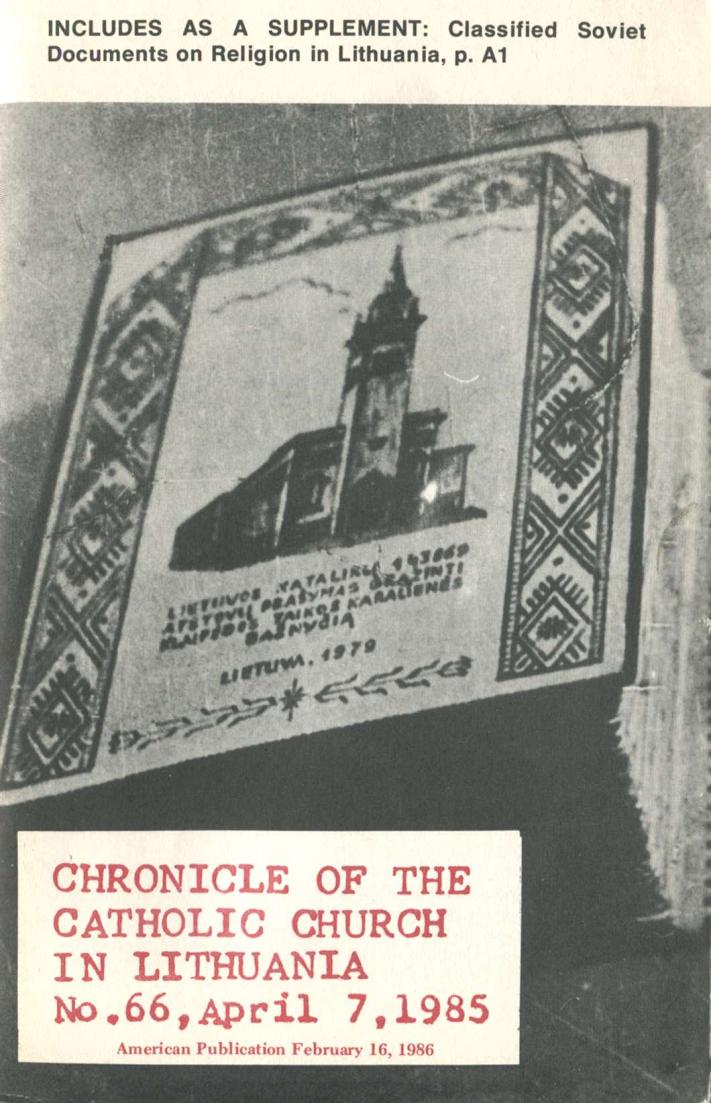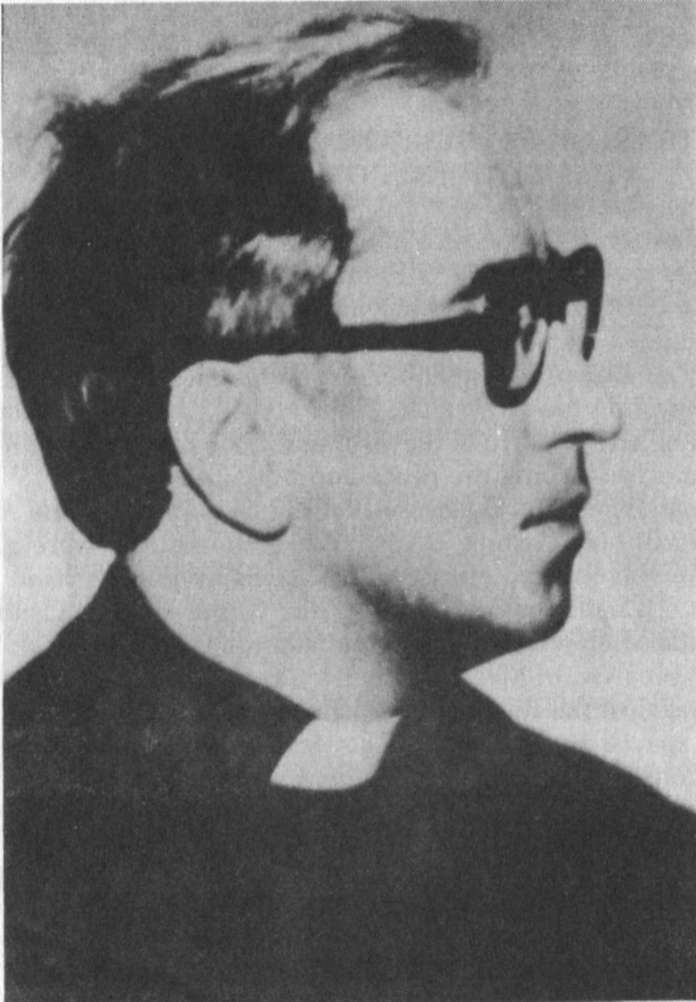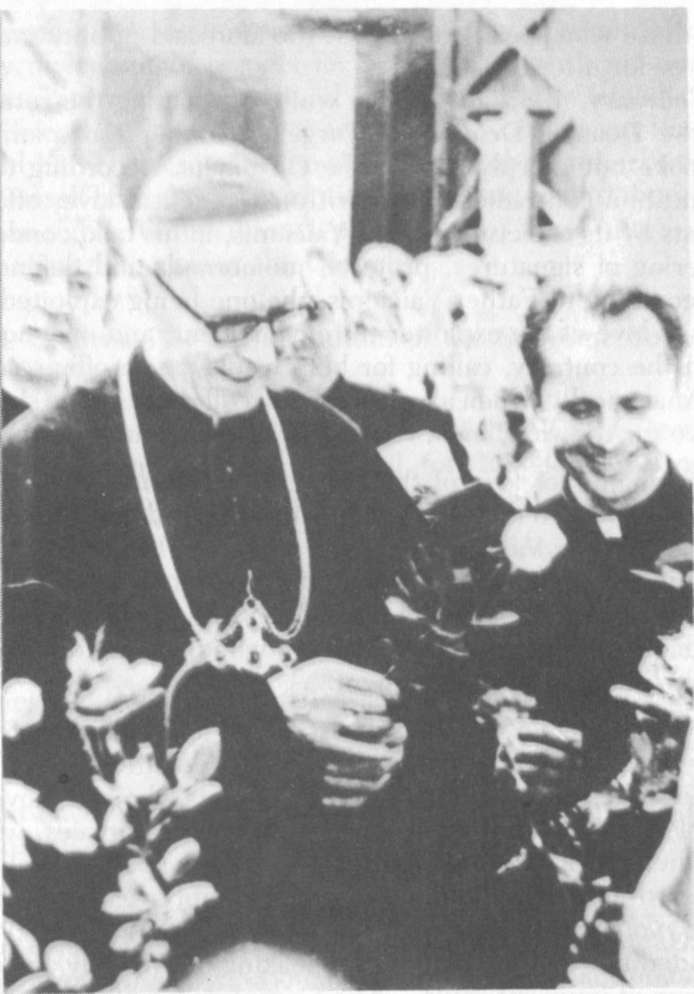
Appearing since 1972
Read this and pass it on!
Reproduce it, if you can!
This issue is dedicated to VLADAS LAPIENIS, who has set out for the second time on the difficult way of the prisoner.
CHRONICLE OF THE CATHOLIC CHURCH IN LITHUANIA, No. 66 
In this issue:
1. Temptation Which We must Reject
3. From the Trial of Father Jonas Kąstytis Matulionis and Young Romas Žemaitis
4. From Material Used Against Father Sigitas Tamkevičius
5. Statement of Father Rokas Puzonas to the Head of the KGB
10. New Underground Publications
Lithuania April 7, 1985
".. .the devil .showed him in a moment of time all the kingdoms of the world and said to him, "I will give you all this power and the glory of all these kingdoms, for it has been committed to me and I give it to anyone I choose. Worship me then and it shall be yours' " (Luke 4,5-7)
If the devil dared to tempt Christ, it is no wonder that we too have to undergo the burden of temptations and trials. It is not only the ordinary laity who are tempted; but so are shepherds of souls and entire church communities.
The dark night of trials and deceitful temptations is being experienced today also by the Church of Lithuania, its leaders and rank-and-file children of the Church. It is not easy to remain faithful to Christ and the spirit of His Gospel.
Catholic Lithuania sympathizes with the Catholics of Poland and the whole nation, shocked by the evil murder of Father Jerzy Popieluszko. The Holy Father is right in saying that such events clearly testify how difficult it is today to be a Polish Catholic.
It is not easy to be a Catholic Lithuanian either. To be a living branch of the Catholic Church in Lithuania today is even more difficult. This is not just a fact which becomes clear only in the light of events — persecutions — in the recent past; it is a painful and difficult fact today. Even though the government atheists are trying to gloss over the situation with their promises, enticements and concessions in secondary matters, nevertheless in fact, they are trying by increasingly deceitful means, to force their way into the internal life ofthe Church, and to wreck it from within. This is much more terrible than open warfare.
We salute the peace effort being organized by the Baltic peoples of the world: WITHOUT FREEDOM FOR NATIONS, THERE CAN BE NO LASTING PEACE. In all peace conferences, this slogan must be raised. What should we call the participants in the Berlin Conference who try to deceive the world and try to give the impression that the faithful of socialist countries enjoy complete freedom, the true champions of peace in socialist countries are harshly persecuted.
On January 17, 1985, in Vilnius, the trial of Father Jonas Kastytis Matulionis and young Romas Žemaitis took place. Only the next of kin of the accused were allowed into this parody of an "open" trial. Acquaintances, friends and intimates prayed at the Shrine of the Our Lady of the Dawn Gates, under the watchful eye of the KGB and militia patroling the street. The court accused Father Matulionis on the basis of Art. 199 Hid of the CriminalCode of organizing religious processions, disturbing the peace and impeding traffic.
Romas Žemaitis was accused on the basis of that same Art. 199 IIId and 201, of resisting arrest. (While the faithful were going in procession to the cemetery, Romas Žemaitis put his hand on the shoulder of Chairman Gudžiūnas, of the City Executive Committee, and would not allow him to approach Father Matulionis. — Ed. Note)
The Prosecutor, Mrs. Skaudienė, accused those on trial of transgressing against the Regulations for Religious Associations, emphasizing that special rayon and local government permission is requisite for religious processions, that it disturbed the peace and impeded traffic, and that Romas Žemaitis actively took part in organizing the procession, inviting children and young adults to participate.
Of the thousand or so people who participated in the All Souls' procession to the cemetery, only four witnesses were called during the trial: Father Gintas Steponaitis, pastor of the parish, who for some vague reason did not appear at athe trial; the chairman of the church committee and two brothers of the young man of trial: Arvydas and Edmundas Žemaitis. (At the time of Father Matulionis' arrest, Edmundas Žemaitis was mistaken for his brother Romas and apprehended in his place. When the mistake was discovered, he was released. (See Chronicle No. 65 — Trans. Note) All other witnesses: militia men, military police, chauffeurs, a woman nonbeliever who somehow showed up in church that evening, the Chairman of the City Executive committee and others. Those accused declined the services of attorneys, prefering to defend themselves... The witnesses spoke in a confused manner, getting tangled up in their testimony. When Father Matulionis asked the driver how long he had been

Father Jonas Kastytis Matulionis
delayed by the procession, the latter replied that it took five minutes to let the procession pass, and no damage had been done because of the delay.
(A Sermon Delivered in 1981 in the Church of Alksnėnai)
Christ, sending his apostles into the world, gave them some instructions on how they should act. Jesus told them that the world would not welcome the apostles, that quite often the children of this world would he like wolves, and that the apostles woidd have to watch out for those wolves — that they would have to he as cunning as serpents and as guileless as doves. Finishing his instructions, Jesus said, "Do not fear those who kill the body, but cannot kill the soul; rather be afraid of him who can destroy both body and soul in hell."
Today, June 22, in many locations in Lithuania and elsewhere, people gather to honor the victims, innocent victims. Some gather to pray for them, others to participate in various commemorations, organized on that occasion.
It is not important on what occasion people gather; it is important that everyone use the occasion to reflect. Today we have gathered in the first place to pray for three priests who, exactly forty years ago, June 22, were horribly tortured to death. Many of you know that story; I can only repeat it in summary.
The morning of June 22, 1945, some soldiers knocked on the door of the rectory of Lankeliškiai, escorting from the rectory the pastor and two other priests who had come to visit. The soldiers took all three priests to the Budavonės woods, and there brutally tortured them to death. One of them was Jonas Petriką, Chaplain of the Marijampolės Ryliškių Jono High School. According to those who knew him, he had actually been in charge of the high school, and had been a good if exacting chaplain.
To: The Head of the Lithuanian SSR KGB
Gopies to: The Bishops and Apostolic Administrators of Lithuania His Magnificence, Rev. Dr. Viktoras Butkus, Rector of the Kaunas Interdiocesan Seminary Vincas Platinskas, Agent of the LSSR KGB
From: Father Rokas Puzonas, Son of Juozas, born August 15, 1956 Residing in Kiaukliai, Rayon of Sirvintai
A Statement
In May 1977, I submitted to the Rector of the Kaunas Interdiocesan Seminary, the Reverend Dr. Viktoras Butkus, my application to the seminary.
A month later, more or less, I received a summons to come to the cadre section of the Alytus Combine for Construction of Experimental Homes (AENSK — prior to entering the seminaray, I worked in the combine sawmill). When I arrived, Vincas Platinskas, a KGB agent from Vilnius introduced himself, and took me to the Alytus Section for Internal Affairs for a talk.
Taking a few sheets of blank paper, and seating himself across from me, he began questioning me, meantime making some kind of notes. The beginning of the conversation was pleasant enough: he asked me about work, my family, whether I had any complaints, etc.
Vilnius
Commissioner for Religious Affairs Petras Anilionis does not allow the Vilnius Archdiocesan Priests' Council and College of Consultors, confirmed by Bishop Julijonas Steponavičius, to function. He suggested that Father Algirdas Gutauskas, administrator of the archdiocese, form a compromise Priests' Council and College of Consul-tors, striking from the list of the College of Consultors confirmed by the bishop the name of Father Jonas Laimimas for his sermon delivered in the church of Kybartai on the anniversary of the arrest of Father Algimantas Keina as reactionary and a former member of the Catholic Committee for the Defense of Believers' Rights, and from the Priests' Council, the name of Father Kazimieras Žemėmis, and to replace them with priests amenable to the government. Msgr. Juzefas Obremski resigned from the Priests' Council.
A similar reorganization awaits the Priests'Council and College of Consultors of Panevėžys. Even the Priests' Councils almost entirely made up by the Commissioner's office are paralyzed. They are doing nothing; no by-laws have been drawn up. The Council must be convened by the bishop or administrator, but he can summon it only in consultation with the Commissioner, It's also required to consult the Commissioner about the agenda.
Whom Does It Serve? As could be expected when the Chronicle appeared, the government atheists were disturbed. The Commissioner for Religious Affairs told the bishops to get rid of the Chronicle. The bishops explained that the Chronicle been born without their knowledge and in fact, they didn't even know who was putting it out. After the failure of this gambit, the KGB began raids and arrests. Trials and harsh verdicts multiplied. Several persons lost their freedom. The KGB tried to establish a dialogue with priests whom they suspected of possibly

Bishop Julijoknas Steponavičius (right) with Father Sigitas Tamkevičius.
Linkmenys (Ignalina Rayon)
On the Feast of All Saints in 1984, the pastor of Linkmenys, Father Jonas Laurifmas, after services in church as provided in the liturgical Ritual, went together with the faithful to pray in the cemetery, which is about 200 meters from the churchyard. Immediately, the pastor was summoned to the offices of the Ignalina Rayon Executive Committee. Vice Chairman Stankevičienė warned the pastor that by such behavior he had disturbed the public order and broken the law. "But even the atheists go to the cemetery to honor the dead! the pastor exclaimed. "This is discrimination against the faithful!"
"What discrimination? You can pray privately," retorted Mrs. Stankevičienė.
Šiauliai
On November 22, 1984, Father Vytautas Brilius, Associate Pastor of Saint George Church in the City of Šiauliai, was summoned to Šiauliai KGB headquarters to see KGB agent Edmundas Jekas. The KGB agent was interested in knowing how the earlier interview he had with Father Brilius had gotten into the Chronicle. The chekist tried to prove that the Chronicle is a libelous underground publication.
From a letter of Father Alfonsas Svarinskas: ...Today is the second Sunday of holy Lent. It is the eve of the Feast of Saint Casimir, so dear to us Lithuanians.
It is early morning. I have finished praying, and now I wish to write to you..
So far, I am in general good health, physically and spiritually, better than my age — sixty — would indicate. Let us believe firmly that God will help us. There is much I would like to tell you, but the paper won't allow it. (Prison censors won't pass it — Ed. Note.)
We must make every effort to meet in heaven. On earth, after all, everything goes by quickly. I have had the grippe for a whole week, and have not been to work. I am still coughing, but I hope that the spring sunshine will cure that.
During holy Lent, I am trying to make a retreat. I am praying more, performing at least small voluntary acts of self - denial — all this for the success of the retreat, that all of us might mature spiritually, be reborn spiritually in preparation for Easter. Only in my soul shall I hear the joyous Easter "Alleluia ", but in my heart there shall be no sadness or dejection. On the contrary, I know that I am doing His will, and that is the most important thing for me.
Methods and Forms of Molding the New Man in the Soviet School
(From the March, 1984 Conference of Republic Educators and Directors of Atheist Work in Vilnius)
Lector J. Sakalauskas of the Central Committee of the Communist Party of Lithuania briefly described for those gathered the religious situation in Lithuania, emphasizing that in the contemporary world, religion is becoming politicized, and politics are taking on a religious coloring. The Church has moved heaven from the cosmos to the human heart. It has become more active.
During the summer of 1983, the Vatican began broadcasting in the Uzbek, Tirghiz and Tadzhik languages. In 1983, four Byelorussian and Ukrainian young men enrolled in the Kaunas Theological Seminary. March 4, 1984, on the Jubilee of Saint Casimir, the Pope in his greetings said, "I greet all those gathered here, their families and especially those struggling for the Faith in Lithuania..." He did not greet ordinary believers, but only extremists and fighters reported Lector Sakalauskas.
The lector recalled the Pastor of Adutiškis, Bronius Laurinavičius, who he said had become distracted and walked in front of a car, thereby stirring up much unnecessary trouble when, at the same time, several persons a day die in automobile accidents and no one bothers about that.
Aušra (The Dawn), No. 44(84). In August 1984, a new issue of Aušra appeared. In an open letter, Lithuanian youth thanked Pope John Paul II for his concern regarding the Lithuanian nation, for his all-embracing Christian love, and expressed the hope that the Holy Father really would visit Lithuania in the future. The article "Become Concerned About the Nation's Moral Culture." urges readers to become better acquainted with the history of their own nation and all humanity: "Let us know how to make use of its lessons. Let us seek to develop into persons, completge Christians and Lithuanians. Let us not be chaff or rubbish carried about by the current of life. Our nation longs for intellectuals and workers marked by a high level of spiritual culture. Upon them depends the cultural revival of the nation. Its life or death." The article "The Crimes of the KGB Are Unending", based on information from the archives of Aušra, presents the ways and means the KGB has of persecuting people untrusted by the totalitarian regime.





